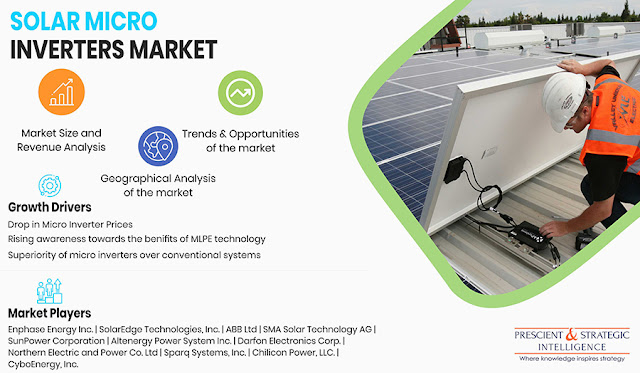The
rising government initiatives across the globe aimed at increasing the number of
photovoltaic (PV) installations are one of the key factors fuelling the demand
for solar micro inverters. Moreover, the drop in the prices of these systems
across the world is pushing their adoption in several countries. In addition to
this, the various advantages of these devices, such as their affordability and
optimum performance, are further pushing their demand throughout the world.
Another
factor contributing toward the rapid growth in demand for solar micro inverters
is the rising production of energy storage systems. These systems are used for
decentralizing the reserves of energy, in order to use them in times of great
need, which also helps in a more efficient operation of the grid. Driven by
these factors, the global solar micro inverters market is expected to
demonstrate a huge upswing in the coming years. Such devices convert the direct
current produced by the PV panels to alternating current.
Get a sample copy of the market analysis : https://www.psmarketresearch.com/market-analysis/solar-micro-inverters-market/report-sample
There
are two types of solar micro inverters widely available in the market:
integrated and standalone. Of these, integrated systems are expected to record faster
rise in sales in future. This is mainly attributed to the declining prices of these
kinds of micro inverters and the shifting focus of major companies toward the
adoption of integrated module systems. Additionally, companies are also focusing
on increasing the frequency of product launches and the number of strategic
partnerships.
As
noted above, the solar micro inverters market is presently witnessing
the increasing focus of major companies toward the incorporation of integrated
model systems. This is mainly ascribed to the rising demand for electricity in
several countries and the ability of high-performance module systems, commonly
known as AC modules, to meet this rising electricity need, owing to their
capacity to provide up to 25% more power than the conventionally used systems.
In addition to this, these systems also offer low installation times.
Solar
micro inverters are commonly used in residential buildings, commercial
structures, and in the utilities sector. Amongst these, commercial buildings
are predicted to adopt these devices at the highest rate in future. The main
factors driving the rapid increase in the integration of these inverters in
commercial buildings are the surging number of commercial PV installations and
declining micro inverter prices throughout the world. Incidentally, owing to
the rising electricity demand in various countries, such as India, China,
Japan, and the U.S., residential buildings had recorded the highest adoption of
these devices in the past.
Geographically,
North America, due to the increasing number of government initiatives, aimed at
boosting the implementation of PV systems, and huge number of residential PV
installations, observed the largest use of solar micro inverters in the past,
and this trend is expected to continue in the coming years. Asia-Pacific (APAC)
is forecast to register the fastest growth in the demand for this equipment in
future, on account of the surging PV installation rate in China, rising demand
for power, reduction in micro inverter prices, and the high efficiency and
enhanced features of these systems.
Therefore,
the adoption of solar micro inverters, owing to the increasing PV installations
and shifting focus toward the large-scale utilization of renewable energy
across the world, is expected to increase considerably in the coming years.




0 Comments